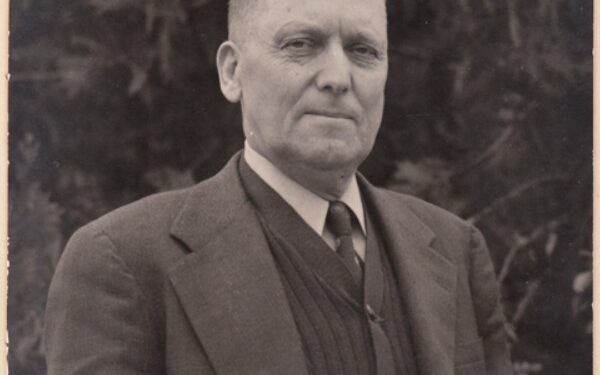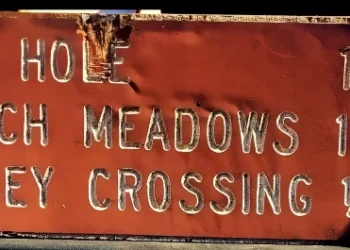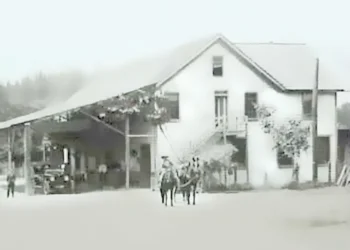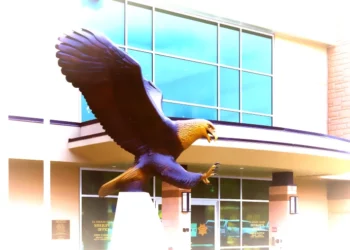By Cris Alarcon, InEDC Writer. (April 9, 2025) — The Sierra Nevadas stood silent in the early morning mist, their jagged peaks reaching into the sky like the broken teeth of an old wolf. Joe Gaspirini wasn’t a man who needed to be told twice about the ferocity of the land. He’d come to these mountains as an immigrant from Switzerland, and the wild, untamed beauty had woven itself into his bones. In a place where a man was defined by the strength of his hands and the sharpness of his wits, Joe had made himself at home.
Pino Grande was a rough place, even by the standards of logging camps. The men who worked the mill there were born from the mountains, their hearts as hard as the wood they felled. But none had a reputation like Joe. He was a quiet man, the sort who spoke in five languages but never wasted a word. He carried a large sheath knife at his side, a tool of necessity in the woods, but over time, it had become something else—a symbol. The kind of symbol that came to mean more than the sum of its parts.
The men called him “Butcher Knife Joe,” though they rarely said it to his face. They didn’t need to. The name was earned one bloody morning in the wilds, when a mountain lion came for him.
Joe had been on his way back to the camp after a long day of work, the scent of pine and sweat thick in the air. His legs were tired from hours of hauling logs and dragging chains, but his mind was sharp, always sharp. His eyes, accustomed to the shadows of the forest, caught every movement, every flicker of life. He wasn’t one to be caught unawares.
He had walked through this land more times than he could count, and he knew the rhythm of it—knew when the air grew still and when it shifted to the sour scent of something dangerous. The moment he stepped into that clearing, the hairs on his neck stood up, and a growl that vibrated deep in his chest split the silence.
A mountain lion.
Not just any lion, either. This was a big one, the kind of beast that made men fear the dark. Its eyes locked with Joe’s, yellow and predatory, a silent promise of death in the air between them. The lion crouched, its muscles taut beneath a thick coat of fur. The mountain lion knew its strength, and it knew Joe’s hesitation would be brief, if he had any at all.
But Joe wasn’t the kind of man who hesitated.
In the span of a heartbeat, the lion lunged. Its teeth flashed, claws slashing through the air with the precision of a blade, but Joe was faster. With one fluid motion, he drew his knife—a heavy, gleaming blade that had seen its share of work, both for cutting timber and for protecting his life.
The lion’s weight slammed into him, knocking him to the ground with the power of a freight train. But Joe’s hands were already at the beast’s throat, his knife buried deep in its side. The animal screeched, a sound that could freeze a man’s blood, but Joe was relentless. With the strength born of desperation and pure survival instinct, he twisted the blade and pulled, carving through fur and muscle like a man splitting wood.
For a moment, there was nothing but chaos—a tangle of flesh, fur, and steel. But when the dust settled, the lion lay still, its lifeblood pooling around Joe’s boots. He stood over it, chest heaving, blood spattered across his shirt, and the great beast at his feet seemed to bow to him in its final surrender.
The silence of the forest returned, as if the land itself were holding its breath.
Joe wiped the blood from his blade, his face a mask of exhaustion and something else—something deeper. This was the wild. And the wild didn’t care who you were. It only cared about who survived.
When Joe returned to camp that evening, the men didn’t greet him with cheers or a round of applause. They knew better. But they looked at him with a different kind of respect—one that only comes when a man has proven himself not just in the camp, but in the heart of the wilderness.
That night, as the campfire flickered and the stories began to flow, the name “Butcher Knife Joe” was whispered for the first time. It wasn’t just a nickname—it was a title. One that would follow Joe through the rest of his days.
For the rest of his life, Joe Gaspirini would be known not just as a man who worked the mill at Pino Grande, but as the one who faced death in the form of a mountain lion—and walked away. His name would live on in the fireside tales of old loggers and drifters, passed down from one generation to the next. And though the forests around Pino Grande would change, Joe’s legend would remain.
In the end, it was no longer the knife that defined him—but the man who had wielded it.
Butcher Knife Joe, the Swiss-born logger who had carved out a life in the wilds of California, lived the rest of his days with the quiet confidence of someone who knew how to face the untamable. And in the end, he passed into legend the same way he had lived—silent, strong, and unshaken.









